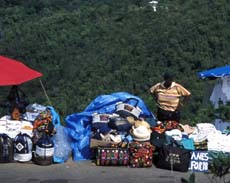Could There Be Totally Commodified Places?

Chinese acrobats performing at Disney World's Epcot -- folk art turned to commodity

The Casting Hall at Disney World in Florida, where you go to look for a job or to be trained -- it is not all spectacle, there.

Roadside hawker on St. Thomas, in the Virgin Islands

The Scottish Highlands from Ballachulish
A completely mechanized Disneyland with no human staff might be closer to a pure commodity. Yet would a completely mechanized Disneyland be a place? Instead of mutual expectations and accepted norms it would have instructions for use. It would be a large machine whose use is purchased and enjoyed in common with other people. But joint and coordinated use of an object does not automatically create a place. Instructions for the joint use of a tool are not the same as the social grammar of a place. A mechanized Disneyland could become a place through repeated use and integration into shared rhythms and rituals of the users, in the way a McDonald's or a mall can receive a new grammar when teens take it up into their group purposes and rituals. But then, like the McDonald's, it would no longer be only a commodity.
We can reverse the question: Could there be an absolutely non-commodified place? Imagine remote villages unvisited by tourists, where people go about their lives in peace and harmony. But the tourists might arrive any day. No place can be in principle immune to commodification. Since all places involve some kind of spatial extension, they are always approachable from the outside, able to be seen and used in ungrammatical ways and vulnerable to touristic observation -- and not just tourists; there are other outsiders who view places: spies, missionaries, salespeople, and the like.